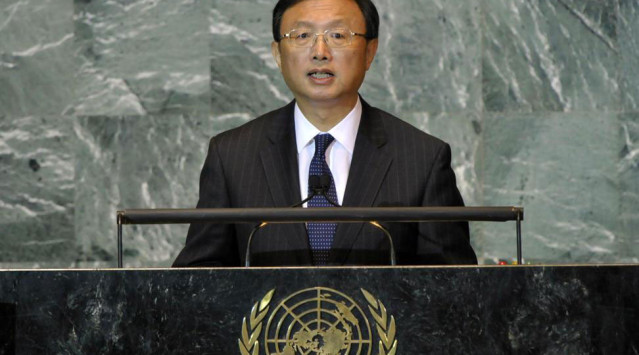by Zhang Guihong
June 18, 2013
I. Introduction
In this Policy Forum Zhang Guihong argues that United Nations Resolutions on North Korea, while necessary, will not solve the nuclear issue on the Korean Peninsula since resolutions do not address U.S.-North Korea relations. Zhang also spells out three basic principles China uses to deal with the security dilemma. The principles are derived from China’s fundamental interests on the Korean Peninsula: maintain peace and stability; denuclearize the peninsula; and use peaceful dialogue to resolve the issue.
Zhang Guihong is the Executive Director of the United Nations Research Center at Fudan University in Shanghai. This article came from a “United Nations Report” sponsored by China’s Ministry of Education and is reprinted with the author’s permission.
The views expressed in this report do not necessarily reflect the official policy or position of the Nautilus Institute. Readers should note that Nautilus seeks a diversity of views and opinions on significant topics in order to identify common ground.
II. Policy Forum
中国与联合国安理会对朝鲜制裁
作者:张贵洪
18 日6 月 2013
朝鲜核和导弹问题是东亚地区的一个热点问题,也一直受到国际社会的关注。针对朝鲜的核试验和导弹发射,联合国安理会先后通过四个制裁决议(指2006年第1718号决议、2009年1874号决议、2003年第2089号和第2094号决议)。朝鲜核和导弹问题及安理会的制裁是中国面临的一个重大安全和外交挑战,影响中国的地区利益和目标,需要我们有明智和有效的应对。
在七年时间里,联合国安理会对一个国家通过四个制裁决议,虽然在历史上也有过,但并不多见。朝鲜于2003年退出《不扩散核武器》条约,并于2006年进行了第一次核试验。朝鲜进行核试是其主权范围的事,但毕竟不是一般的主权行为,而且对地区安全和国际核不扩散体制不利,与本地区其它国家和国际社会的愿望和利益不符,与朝鲜参加的六方会谈的目标和方向相背。
朝鲜核试并不能成为其长久之计。朝鲜进行核试的原因和动机是复杂的,既有其国内的考虑,更有地区局势和朝美关系的因素;既是军事上的一种决策,更有外交、政治和经济上的深层考虑。但核武并不能确保朝鲜的安全,外援也无法解决朝鲜的民生问题,朝鲜的安全终久要靠增长的经济、开明的政治、友好的外交、适度的军事来实现。
朝鲜核试,美国是有责任的。长期以来,美国对朝鲜实行敌视政策,拒绝与朝鲜开展双边直接对话和建立正常的外交关系,一度视朝鲜为“流氓国家”和“邪恶政权”,与日本和韩国结成军事同盟,在日韩驻军,频繁在东亚地区进行军事演习,使朝鲜深感威胁、不安和孤立。
联合国安理会对朝制裁是必要的,但制裁并不是解决朝鲜问题的最有效之举。制裁决议反映了国际社会对半岛无核化的共同愿望和对朝鲜核试行为进行惩罚的共同意志。故且不论制裁的效果如何,制裁最终也并没有能阻止朝鲜的进一步核武化。因为制裁并不能改变朝鲜的政策和行为、不能缓和本地区的紧张局势、不能解决朝美关系的种种问题。
中国在朝鲜半岛问题上有三个基本原则:一是坚持维护半岛的和平稳定;二是坚持半岛无核化;三是坚持和平对话方式解决问题。这意味着,中国反对任何一方采取破坏半岛和平稳定的行为,无论是朝鲜的核试或其它冒险行为,还是美国在本地区加强军事部署或进行军事演习,抑或有的国家乘人之危、趁火打劫;中国也反对在半岛试验、部署、使用或威胁使用核武器;中国也反对使用或威胁使用武力处理彼此间的矛盾和争端。这三个原则之间是相互关联的,半岛无核化是实现半岛和平稳定的应有之义和必经之路,和平对话是实现半岛无核化和和平稳定的唯一方式。
这三个原则是基于中国在半岛的基本利益和目标:半岛稳定、半岛无核和中朝友好。基于半岛持续紧张、朝鲜拥核、中朝冷淡的现实,中国的政策宜做适度调整,以便更好地应对复杂的半岛局势。一是把朝鲜的去核化承诺与提供经济援助和安全保障挂钩;二是在联合国框架内参与制裁和援助;三是向朝鲜明确中国的原则和底线。
(作者复旦大学联合国研究中心执行主任
本文系教育部《联合国发展报告》项目成果之一。)
III. NAUTILUS INVITES YOUR RESPONSES
The Nautilus Peace and Security Network invites your responses to this report. Please leave a comment below or send your response to: nautilus@nautilus.org. Comments will only be posted if they include the author’s name and affiliation.


